You’ve probably noticed on an average trip to the grocery store it’s hard to miss how many items are fortified with B vitamins. Which brings to light the fact that these are vitamins we actually really need.
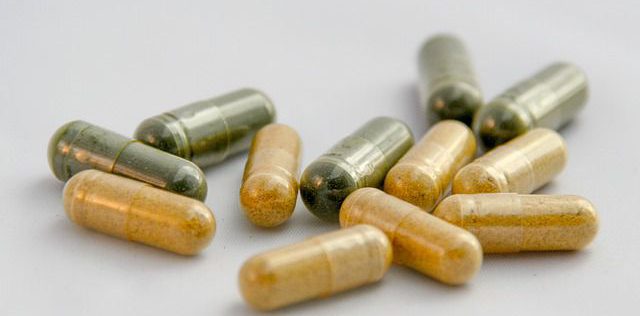
Supplementing with B’s can be a solid way to meet this need, and having them all in one complex can really simplify things. Today we’ll look at how to choose the best vitamin B-complex along with benefits, signs of deficiency, and why certain diets, lifestyles and life stages may create more risk for deficiency, and the best forms for optimal delivery and absorption.
B vitamins play an important role in the body and work not only individually, but also collectively to encourage cell growth and division, regulate nervous system, immune system, digestive system, assist in energy production, support metabolism, promote red blood cell formation, and reduce risk of serious birth defects of the spine and brain.
Overall, the benefits of healthy vitamin B levels include increased energy, more stable moods, healthier eyes, skin, and hair, and less risk of fatigue, anemia, infection, and serious birth defects.
What are the Different Types of B’s and Their Benefits and Sources?
The profile of B vitamins includes B1 (thiamine or thiamin), B2 (riboflavin), B3 (niacin), B5 (pantothenic acid), B6 (pyridoxine), B12 (cobalamin), folate (folic acid), and biotin. As always, the best way to get B vitamins is first and foremost by eating a variety of whole, unrefined foods.
A variety of foods fit the bill, although the most abundant sources include meat, organ meats, dairy, and eggs. It’s much more of a challenge for those eating a vegetarian or vegan diet to get enough of particular B’s making vitamin B-complex supplements the most viable option.
It helps to take a closer look at the different types of B vitamins, how each can benefit the body, and which types are found in which foods to gain a clear understanding of B-complex benefits:
B1 (Thiamine or Thiamin)
What: Thiamine aids in conversion of carbohydrates to energy, supports metabolism, helps regulate appetite, normal functioning of muscles including the heart, and nervous system.
Where: Rich sources include pork, dairy foods, dark leafy greens, green peas, mushrooms, lentils, almonds, pecans, pine nuts, sunflower seeds, dried beans, wheat germ, whole grains and fortified/enriched whole grain products.
B2 (Riboflavin)
What: Riboflavin supports formation of red blood cells and also encourages healthy skin.
Where: It is supplied in lean meats, poultry, fish, eggs, dairy foods, dark leafy greens, asparagus, mushrooms, and fortified/enriched whole grain products.
B3 (Niacin)
What: Niacin promotes a healthy cardiovascular and digestive system, nerve function, energy production, and also encourages healthy skin.
Where: Sources include meats, poultry, fish, eggs, dairy products, avocado, mushrooms, nuts/nut butters, legumes, and fortified/enriched whole grain products.
B5 (Pantothenic Acid)
What: Sometimes referred to as the “anti-stress” vitamin, the role of pantothenic acid is to assist with manufacture of red blood cells, regulate stress hormones in the adrenal glands, promote healthy enzyme function and energy production, and help synthesize cholesterol.
Where: Best sources include beef, organ meats, poultry, egg yolks, yogurt, avocado, sweet potatoes, broccoli, kale, cauliflower, mushrooms, sunflower seeds, and legumes.

B6 (Pyridoxine)
What: Pyridoxine aids in metabolism, stabilization of blood sugar, the growth of red blood cells, production of antibodies, and functioning of immune system.
Where: Meats, poultry, fish, eggs, nuts, sunflower seeds, potatoes, bananas, nuts, legumes especially chickpeas/garbanzo beans, dark leafy greens, whole grains, and fortified cereals are all sources of B6.
B12 (Cobalamin)
What: B12 is vital for red blood cell formation, promotes a healthy brain and nervous system, and aids in regulating metabolism.
Where: It is primarily found in animal sources such as meats, beef liver, poultry, seafood, eggs, and dairy foods. Some fortified soy products, plant milks, nutritional yeast, and cereals also contain B12.
Folate (Folic Acid)
What: Folic Acid promotes healthy red blood cell activity and nervous system function. It also acts as a co-enzyme for producing energy and is required for healthy growth and development, playing a huge role in pregnancy to reduce risk for serious birth defects.
Where: It’s found in poultry, pork, legumes, broccoli, avocado, spinach, romaine, mushrooms, oranges/orange juice, peanuts, sunflower seeds, wheat bran, and fortified/enriched whole grain products.
Biotin
What: Necessary for healthy metabolism, biotin also promotes healthy hair, skin, and nails.
Where: Rich sources include liver, egg yolks, pork, salmon, avocado, most fruits and veggies, and whole grain foods.
Clearly, all eight of these vitamins are imperative for a number of important functions in the body and the it’s important to get as many as possible from foods. As an alternative, the benefits of vitamin B-complex in supplement form is a viable option for fulfilling healthy levels and to avoid or correct deficiencies.
Vitamin B Deficiency Clues – Are You at Risk?
If an adequate amount of B vitamins are not consumed in the daily diet, it leads to deficiency and while the only way to know for sure if you have a vitamin B deficiency is through a blood test, it’s also beneficial to listen to your body and tune in to any important clues that it may be trying to tell you.
In addition, older adults, pregnant women, and those who eat a vegetarian or vegan diet require larger amounts of some types of B vitamins. Certain conditions such as Celiac, Crohn’s and HIV require larger amounts of some B’s due to poor absorption. And, stress, high alcohol consumption, regular intake of coffee, tea, and certain medications can also rapidly deplete these vitamins.
So what does a deficiency look like? Symptoms of a possible vitamin B-complex deficiency can manifest as the following:
- fatigue or anemia
- lack of coordination, muscle weakness or wasting
- pain or soreness of muscles or joints
- tingling or numbness in fingers and toes
- dry skin or dermatitis
- cracks at the corners of the mouth
- frequent bruising or slow healing wounds
- Confusion, poor memory, headache, or increased sensitivity to light
- Moodiness, irritability, insomnia, or depression
- Gastrointestinal issues (nausea, vomiting, diarrhea)
- Neurological birth defects (folate/folic acid deficiency in expectant mothers)
It’s important to note that while all B vitamins are essential, vitamin B12 is one that you don’t want to fall short on for a number of reasons. It’s also important to note that certain B vitamins work in conjunction with one another to assist uptake, which is where a complex can come in handy.
It’s important to stress the dangers of B12 deficiency, and note that it is commonly experienced in older individuals, vegetarians and vegans, and individuals with digestive malabsorption. It’s not something to be taken lightly because this vitamin is vital for the formation of red blood cells, DNA, and a healthy brain and nervous system, so even a mild deficiency can result in things like impaired mental function, fatigue and weakness, and even anemia.

Symptoms of B12 deficiency usually develop gradually over the course of several months to a year before the connection to a lack of it is made. The good news is that symptoms can usually be reversed with B12 supplementation.
Are B Vitamins Water-Soluble, and What About Safety?
B vitamins along with vitamin C are water-soluble. Just like it sounds, what this means is that these type of vitamins dissolve in water which allows them to dissolve rather quickly and as a result deliver nutrients to the body’s tissues without storing them. Basically your body uses what it needs and any excess amounts pass through the body and get excreted in the urine, making the risk of overdose lower.
Have you ever taken B vitamins and noticed that your pee is bright yellow? Although it can be shocking at first, this is a prime example of excess water-soluble vitamins making their way out of the body.
Due to the nature of water-soluble vitamins the body needs a steady daily intake to provide a continuous supply of these nutrients, which can be accomplished through diet, supplements, or a combination of both.
While food is the best source, water-soluble vitamins can be easily destroyed or washed out during storage or preparation. Heat and exposure to air, as well as boiling foods are all things that can cause nutrients to get lost. Properly storing produce and whole grains away from bright light, steaming foods, and reserving cooking liquids from vegetables to prepare soups are a few ways to preserve nutrients.
Although the risk of overdose is lower, if you choose to supplement with B vitamins, like many supplements, they can interact with certain medications. Additionally, certain medications are known to decrease vitamin B levels in the body. So, if you currently take any medication or have chronic health concerns, you want to talk to your health care practitioner before supplementing.
Can Too Much Folic Acid Interact With B12?
It’s important to note that like anything, too much folic acid is not a good thing. The blood disorder anemia is oftentimes how a vitamin B12 deficiency is identified and diagnosed, and while one of the things too much folic acid can prevent is the development of anemia, this can mask a B12 deficiency and reduce the chance of correcting it as the underlying cause.
That said, how much is too much folic acid? Recommendations for adults suggest not to exceed 1000 mcg of the vitamin each day, taking into account the amount you get from diet and all supplements combined.
Methylation, Sublingual, B50, B100 – What Does it All Mean?
An increasing amount of consumers are now concerned with methylation. Methyl-WHAT??? Methylation is really just a fancy scientific term for active forms of B vitamins that your body can actually absorb and utilize. Coenzymated is another term for B’s in their active form that don’t need to be converted by the liver.
It’s estimated that around 30% of the population is unable to convert certain B vitamins including Folate and vitamin B12 into the form their body can use, and methylation can really help with this issue.
Many people are familiar with the term sublingual where the supplement gets delivered under the tongue for direct absorption via capillaries. Sublingual B-complex comes in either liquid, “dots”, or tiny easily dissolvable tablets.
Depending on the source, there is conflicting information as to whether this delivery is really more effective than capsules or tablets, although it seems to make sense especially for those who have a hard time with absorption in the gut.
A B50-complex is a supplement that contains 50 mg of most of the B’s and the same with B100 – these supplements contain 100 mg of most of the B vitamins. Other common names for these supplements include “Balanced B50, Balanced B100, Stress B-Complex, and Super B-Complex”. Easy enough right?
Some helpful tips: Of course each supplement will have instructions on how to take it, but there are a couple things I’ve experienced when taking my B’s that may help:
First off, I find the best time to take them is either in the morning or afternoon when you tend to feel more sluggish. I avoid them at night because of the energy factor. I also tend to experience a sensitive stomach with non-food based vitamin B’s, so I take mine either with food or close enough after a meal to avoid any issues (whole food based are fine on an empty stomach).
And, when taking a sublingual I always try to keep it under my tongue for at least 30 seconds and up to 60 for maximum absorption into the bloodstream, even if the instructions recommend less time.
Now that we’ve covered each B in detail, what is the best B-complex supplement? Check out these five high-quality supplements that made the cut. Although it’s listed with each supplement description, all of these formulas are suitable for vegetarians and some for vegans as well.
5 B-Fabulous-Complexes
Garden of Life Vitamin Code Raw B-Complex
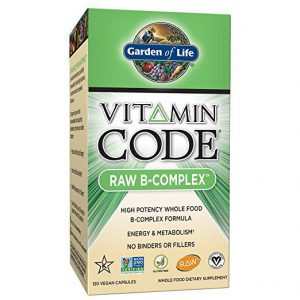
Highlights
- Whole food B-complex utilizing methylation for optimal absorption
- Contains a raw organic fruit & vegetable blend and raw probiotic & enzyme blend
- Easy to swallow vegetarian capsules – gentle on the stomach
- 60 or 120 capsules, suggested use: 2 daily
- Non-GMO, raw, vegan, and free of gluten, dairy, binders and fillers
MegaFood Balanced B Complex
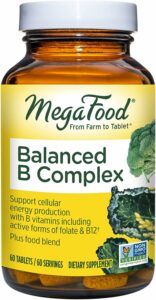
Highlights
- FoodState B-complex utilizing methylation for optimal absorption
- Gentle on the stomach vegetarian tablets
- 30 – 90 tablets, suggested use: 1 daily
- Vegan, non-GMO, free of gluten, dairy and soy, and kosher certified
New Chapter Fermented Coenzyme B Complex
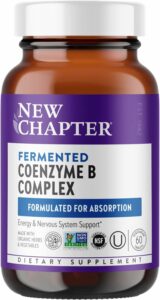
Highlights
- Whole food B-complex for optimal absorption
- Contains an herbal stress and energy support blend, cardio blend, and immune support blend
- Gentle on the stomach vegetarian tablets
- 30-180 tablets, suggested use: 1 daily
- Organic, non-GMO, vegetarian, kosher, and free of gluten, dairy, and synthetic fillers
Solgar Sublingual Liquid B-12 2000 With B-Complex

Highlights
- Liquid sublingual B-complex for quick and direct absorption under the tongue
- Great tasting berry flavor
- 2 oz with 59 servings at 1 ml OR half that at 2 ml daily
- Suitable for vegetarians, and free of gluten, dairy, soy, yeast, sugar, artificial flavor, sweetener and color
Country Life Coenzyme B-Complex
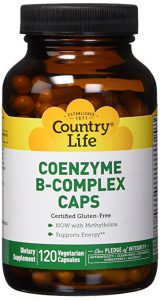
Highlights
- Coenzymated B-complex for optimal absorption
- Contains inositol, phosphatidylcholine, PABA and alph-lipoic acid
- 60 or 120 capsules, suggested use: 1-2 daily
- GMP (good manufacturing practices) certified
- Vegetarian, kosher, and free of gluten, milk, sugar, preservatives, artificial sweeteners, flavors and colors, and fillers
A high-quality vitamin B complex can pay off HUGE when it comes to your energy and stress levels, your nervous system, your gut, and a number of other important factors for your overall health. Love to hear your thoughts in the comments below!
